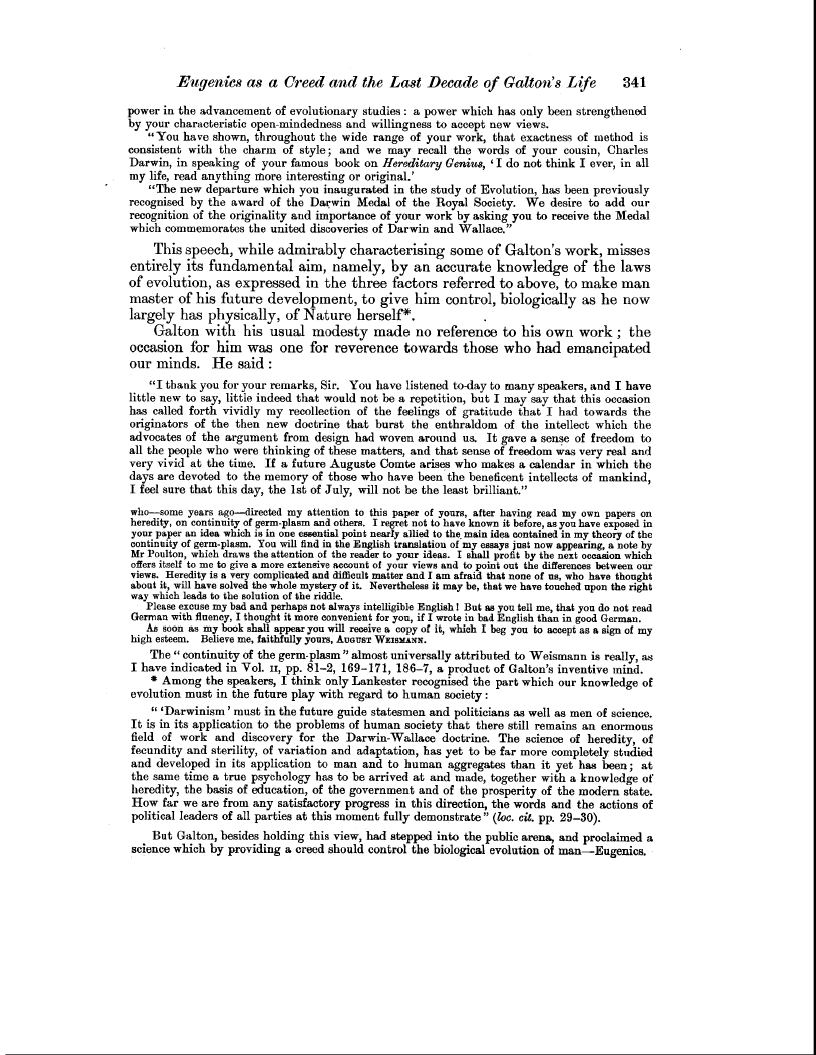| ||||||

OCR Rendition - approximate
Eugenics as a Creed and the Last Decade of Calton's Life 341 power in the advancement of evolutionary studies : a power which has only been strengthened by your characteristic open-mindedness and willingness to accept new views. "You have shown, throughout the wide range of your work, that exactness of method is consistent with the charm of style; and we may recall the words of your cousin, Charles Darwin, in speaking of your famous book on Hereditary Genius, `I do not think I ever, in all my life, read anything more interesting or original.' "The new departure which you inaugurated in the study of Evolution, has been previously recognised by the award of the Darwin Medal of the Royal Society. We desire to add our recognition of the originality and importance of your work by asking you to receive the Medal which commemorates the united discoveries of Darwin and Wallace." This speech, while admirably characterising some of Galton's work, misses entirely its fundamental aim, namely, by an accurate knowledge of the laws of evolution, as expressed in the three factors referred to above, to make man master of his future development, to give him control, biologically as he now largely has physically, of Nature herself*. Galton with his usual modesty made no reference to his own work ; the occasion for him was one for reverence towards those who had emancipated our minds. He said "I thank you for your remarks, Sir. You have listened to-day to many speakers, and I have little new to say, little indeed that would not be a repetition, but I may say that this occasion has called forth vividly my recollection of the feelings of gratitude that I had towards the originators of the then new doctrine that burst the enthraldom of the intellect which the advocates of the argument from design had woven around us. It gave a sense of freedom to all the people who were thinking of these matters, and that sense of freedom was very real and very vivid at the time. If a future Auguste Comte arises who makes a calendar in which the days are devoted to the memory of those who have been the beneficent intellects of mankind, I feel sure that this day, the 1st of July, will not be the least brilliant." who-some years ago-directed my attention to this paper of yours, after having read my own papers on heredity, on continuity of germ-plasm and others. I regret not to have known it before, as you have exposed in your paper an idea which is in one essential point nearly allied to the main idea contained in my theory of the continuity of germ-plasm. You will find in the English translation of my essays just now appearing, a note by Mr Poulton, which draws the attention of the reader to your ideas. I shall profit by the next occasion which offers itself to me to give a more extensive account of your views and to point out the differences between our views. Heredity is a very complicated and difficult matter and I am afraid that none of us, who have thought about it, will have solved the whole mystery of it. Nevertheless it may be, that we have touched upon the right way which leads to the solution of the riddle. Please excuse my bad and perhaps not always intelligible English I But as you tell me, that you do not read German with fluency, I thought it more convenient for you, if I wrote in bad English than in good German. As soon as my book shall appear you will receive a copy of it, which I beg you to accept as a sign of my high esteem. Believe me, faithfully yours, AuouST WEISMANN. The " continuity of the germ-plasm " almost universally attributed to Weismann is really, as I have indicated in Vol. ii, pp. 81-2, 169-171, 186-7, a product of Galton's inventive mind. * Among the speakers, I think only Lankester recognised the part which our knowledge of evolution must in the future play with regard to human society "'Darwinism' must in the future guide statesmen and politicians as well as men of science. It is in its application to the problems of human society that there still remains an enormous field of work and discovery for the Darwin-Wallace doctrine. The science of heredity, of fecundity and sterility, of variation and adaptation, has yet to be far more completely studied and developed in its application to man and to human aggregates than it yet has been; at the same time a true psychology has to be arrived at and made, together with a knowledge of heredity, the basis of education, of the government and of the prosperity of the modern state. How far we are from any satisfactory progress in this direction, the words and the actions of political leaders of all parties at this moment fully demonstrate" (loc. cit. pp. 29-30) But Galton, besides holding this view, had stepped into the public arena, and proclaimed a science which by providing a creed should control the biological evolution of man-Eugenics.
|